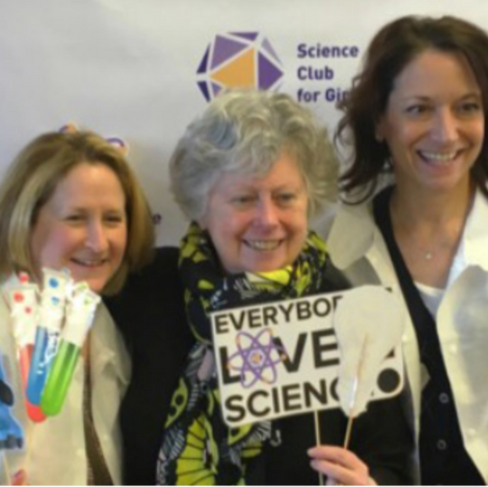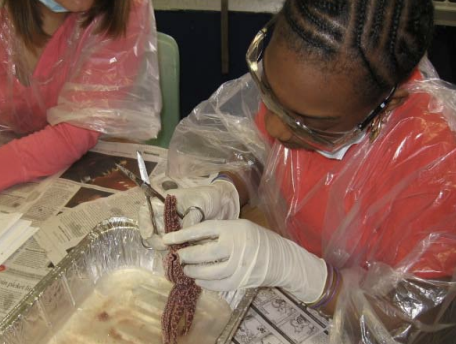Meet Mary McGowan, Science Club for Girls Co-Founder! Born of Irish immigrant parents, her upbringing stressed the importance of education, persistence, and caring for those in her community. This is what ultimately led to her recognizing the need for fostering STEM education and interests in young girls and creating Science Club for Girls alongside Co-Founder Beth O’Sullivan.

In celebration of our 30th anniversary, we had the opportunity to interview Mary about the creation of SCFG. Here, she recounts the story:

“Beth O’Sullivan, the co-founder of Science Club, and I met when we volunteered in our daughters’ kindergarten class at King Open School in Cambridge in 1994. We had both read the American Association of University Women’s report ‘How Schools Shortchange Girls’ and were struck by their finding that girls lose confidence in their ability to do mathematics and science as they move forward in elementary and high school. Beth had been the only woman in her higher mathematics classes at MIT over 20 years earlier. It was difficult for her [and] we wanted better for our daughters. We committed to helping to make sure that girls like our daughters persisted in [STEM] and filled those classes where Beth had once been alone.
Of course, the question was how to do that and we had no idea! We approached the wonderful teachers and administrators at King Open to talk about the study. They responded by asking us what we wanted to do about it. We gave it some thought. Perhaps, if, starting at an early age, girls got together to do fun, hands-on experiments and were mentored by women scientists, no one could ever tell them that women couldn’t do science and mathematics. It would be a start. The supportive staff at King Open responded, ‘Great idea, you are now a committee. Make it happen.’

Beth knew a volunteer group at MIT who suggested an undergraduate woman who was eager to create curriculum and run a club. We talked about the pros and cons of having boys join the clubs too, but, supported by immigrant parents who believed girls could do anything, I had attended an all girls high school and knew the power of young women working together. So, we decided that the clubs should be all girls. Knowing that Beth’s and my parents would have found it difficult to pay a fee for any afternoon program, we decided that the clubs should be free to assure access for all girls.
We sent a flier home announcing the club to King Open girls in grades K-2 one Friday afternoon. We didn’t know what the response would be, but we thought that at least our daughters wanted to join so we wouldn’t be totally wasting the time of the generous volunteer from MIT. But, by the time Beth walked her daughter home that Friday afternoon, the messages from parents who wanted their girls in the club filled her answering machine. And parents kept calling. Beth scrambled to arrange other volunteer scientists and asked the teachers at King Open, who in our experience were always putting children’s needs first, to make more of their classrooms available.

During this time, we kept talking to the parents, including those whose daughters had not originally signed up for Science Club, the teachers at King Open, and the scientist mentors who were running the clubs. They taught us that although all women were underrepresented in the fields of science and mathematics, even fewer women of color and first-generation college students were represented. Based on the advice of this larger community, we focused our mission statement to bring in as many of those girls as possible.
Over time more and more girls wanted to join Science Club and other schools in Cambridge and in nearby cities wanted to offer Science Club to their girls. Although we had help from volunteer parents, Beth and I realized that it was not possible, or a best practice, to have us running the clubs without a more formal structure. Someone told us we could get a grant to help support the clubs so, Beth taught herself to write grants and with the support of our first funder we were able to start hiring employees. On the suggestion of people at other local organizations, we formed a board of community members and people with experience in fundraising and their wise advice made all the difference.
And the clubs thrived. I remember packing up supplies one Friday afternoon at King Open School after Science Club finished for the day. All of a sudden, I caught sight of a line of 4th grade girls, led by their scientist mentor, dancing through the empty cafeteria singing a song they had made up about having just dissected a cow heart in Science Club. Imagine that!
The young women and gender-expansive youth in Science Club continue to amaze. The girls who come every week to the clubs show intelligence and joy doing experiments. Junior Mentors take a special role in the lives of younger girls and show them that they can shine no matter their age. College students and older mentors are women of great accomplishment who consider it important to teach and support younger women, often doing so to recognize and honor the women who mentored them. Our staff and board work hard with great imagination and persistence. These women prove that, in spite of the problems women still face, STEM will move forward confidently and inexorably under their direction.”
Thank you, Mary, for taking us to the start of it all and sharing your vision for the future of STEM. We can only imagine the growth of the next 30 years of Science Club for Girls, all thanks to the foundation built by our co-founders.













Comments